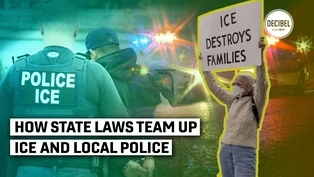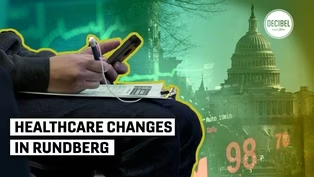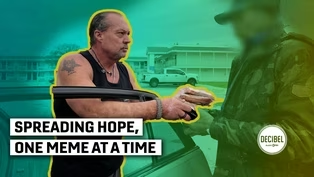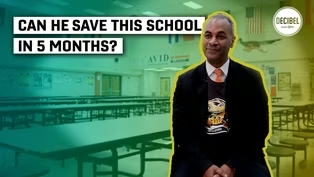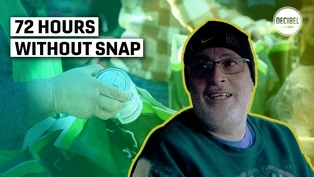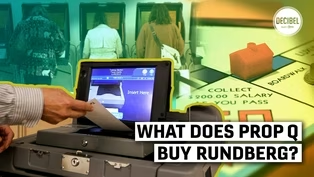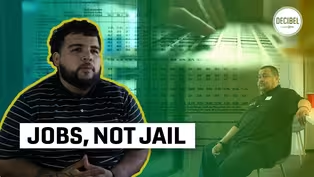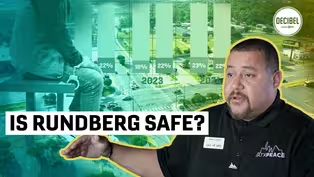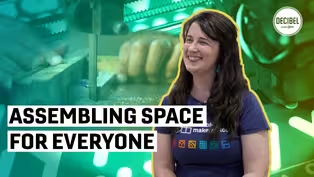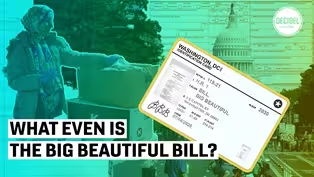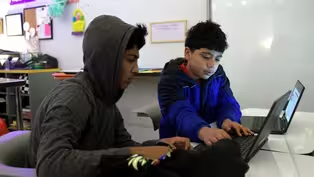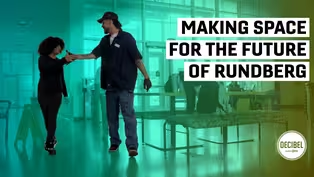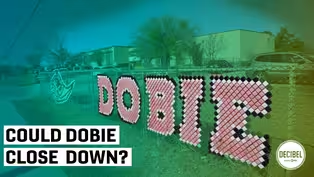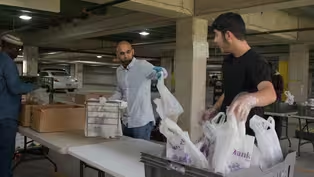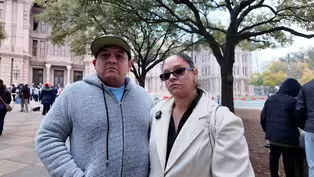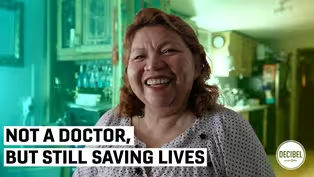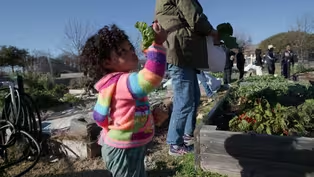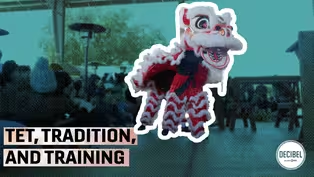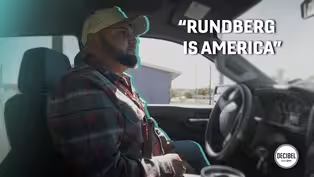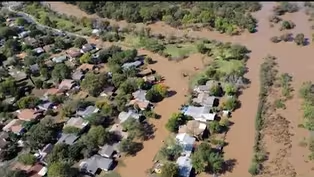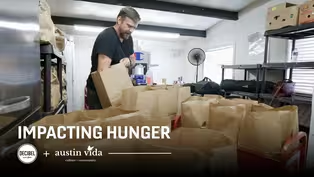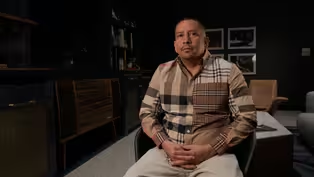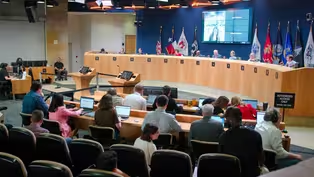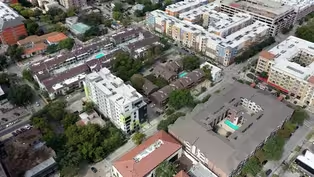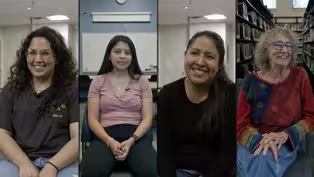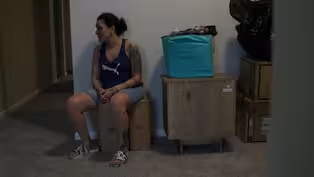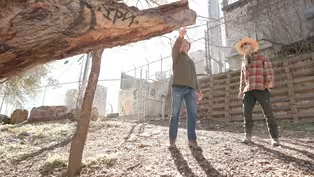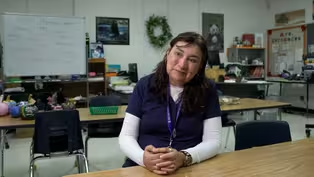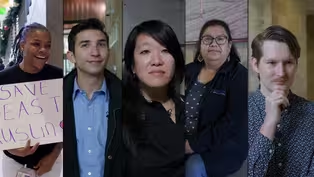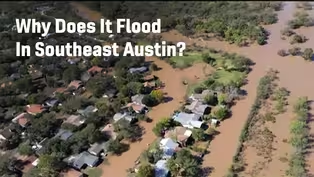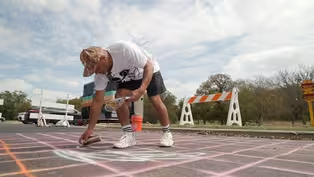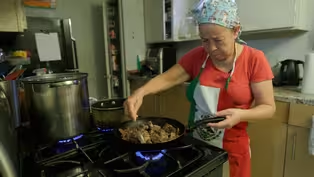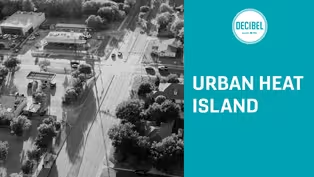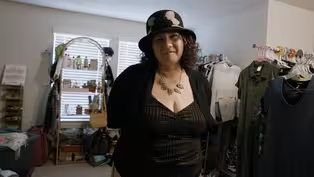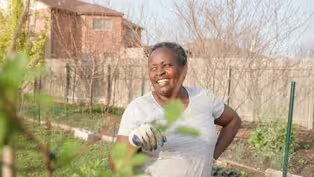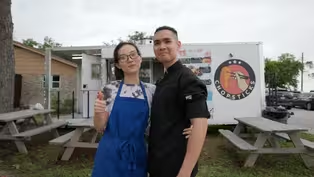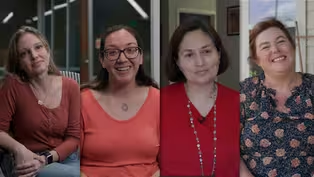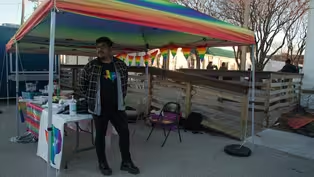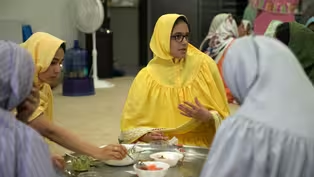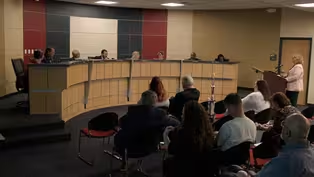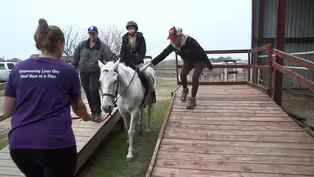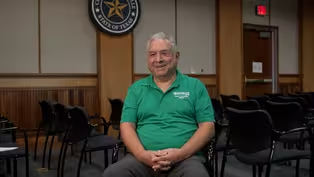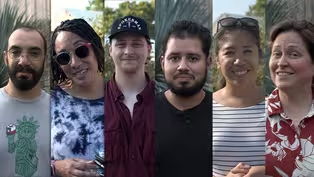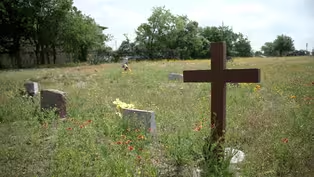Decibel
Is Rundberg Safe?
Clip | 15m 48sVideo has Closed Captions
Does the neighborhood deserve its dangerous reputation? And if so, what can be done about it?
Does the neighborhood deserve its dangerous reputation? And if so, what can be done about it? We spoke with police, community groups, residents and experts about how Austin can address safety in this community.
Problems playing video? | Closed Captioning Feedback
Problems playing video? | Closed Captioning Feedback
Decibel is a local public television program presented by Austin PBS
Funding for Decibel is provided in part by Texas Mutual and Roxanne Elder & Scott Borders
Decibel
Is Rundberg Safe?
Clip | 15m 48sVideo has Closed Captions
Does the neighborhood deserve its dangerous reputation? And if so, what can be done about it? We spoke with police, community groups, residents and experts about how Austin can address safety in this community.
Problems playing video? | Closed Captioning Feedback
How to Watch Decibel
Decibel is available to stream on pbs.org and the free PBS App, available on iPhone, Apple TV, Android TV, Android smartphones, Amazon Fire TV, Amazon Fire Tablet, Roku, Samsung Smart TV, and Vizio.
- Welcome, welcome, everybody.
Thank you all so much for coming to the- - [Narrator] Tonight, as it often does, the Adobe Middle School cafeteria has been transformed into a community gathering space.
District 4 council member, Chito Vela, who has promised this will all wrap up before the Alice in Wonderland production starts next door, is here to talk about one specific thing: safety.
- We want people to be able to get from one side of Rundberg to the other side of Rundberg, you know, without having to go through a very kind of dark and possibly a dangerous area.
- [Narrator] Safety is a big concern for Rundberg.
It has a reputation as one of Austin's most dangerous neighborhoods.
- There was a lot of prostitution, you know, drugs, all that.
- [Narrator] But others say that reputation has overshadowed the truth about this community.
- The core area of Rundberg, it's safe.
- [Narrator] So is Rundberg safe?
And what do residents here need?
(light suspenseful music) Officer Rubin Espinoza has been with the Austin Police Department for 18 years, and he spent all of that time here in Rundberg.
- I did day-shift patrol, Spanish-speaking, accident investigator.
I've been very busy in Rundberg.
- [Narrator] So he knows the area's reputation.
- This area you mostly see is a lot of violent crimes.
But the core area of Rundberg, it's safe.
but there's this small, there's few individuals that make it dangerous in these little spots that are dangerous.
But majority of Rundberg area is safe.
(light suspenseful music) - [Narrator] But what does he mean by the Rundberg area?
There's a couple of different ways to look at it.
The Austin Police Department breaks the city down into sectors.
Rundberg is in the Edward Sector, and it's large, about the same size as all of Round Rock.
They used to break down crime stats by sector, but now they go by council districts.
Rundberg is in District 4.
They don't line up perfectly, but a few areas that APD considers hotspots show up in both: Georgia in Powell, for example, and Lamar in Rundberg.
But what do those numbers show?
- Talking about just Rundberg or just in general?
- Or Edward Sector.
Lieutenant Bone is the operations lieutenant for Northeast Area Command, which includes Rundberg.
- So when we look in the data, last year, 2024, when you take into account all nine regions or all nine sectors within the city, Edward was number one unfortunately with homicides, unfortunately with a lot of the violent crimes.
One of the things that we've noticed this year is that the first quarter of 2025, our homicide rate is down.
We've also noticed that there's also a decrease in some of our other violent crimes.
(light suspenseful music) There's so many different components when it comes to crime.
So we can't specifically say it's this problem, it's that problem.
It's just when a problem comes up, how are we dealing with it.
- [Narrator] Crime statistics from APD show the area does have higher rates of crime.
In 2024, District 4 accounted for 23% of the homicides in Austin and 22% of aggravated assaults.
Those numbers are pretty consistent over the past couple of years, but we also need to take a step back and get a better look at these numbers.
How much crime is taking place in Austin?
- Yeah, in general, Austin crime statistics are going to show lower levels of violent crime, at least relative to other cities of similar size.
- [Narrator] Jamein Cunningham is an assistant professor of law and public policy at the University of Texas at Austin, and he says compared to other cities like ours, Austin has relatively low crime rates.
- The main number that people look at are things such as homicides.
Homicides are gonna be much lower than other cities of similar size as it relates to property crimes, things like car theft.
Those things may be on the rise, but still relatively less than other cities.
- [Narrator] But that's still a problem residents have to live with.
- [Officer] I miss the good all times, man.
Like, that's what I needed.
- That's when they actually had a dollar menu, right?
(officers laughs) - [Narrator] Abel Lopez grew up in Rundberg in the Brownie community, and he remembers having a hard time sleeping when he was a kid.
- Like, I would hear gunshots every day.
From the age of like 8 to 12, all I saw was gangs, drugs, and violence.
You know, obviously, that's where the issues come, where we're like, this is normal to us.
- [Narrator] So why is this happening in this part of town?
Dr. Cunningham has some thoughts on that.
- There's several predictors of places that have higher or lower levels of crimes.
We know that places that are more segregated along racial and income lines, we know that if there's a population with less educational attainment or have less access to jobs, we have high levels of crime.
(light suspenseful music) And this basically has to do with access to opportunity, access to stable employment, access to quality education.
- [Narrator] Rundberg does sit within Austin's Eastern Crescent, an area where predominantly Black and Latino communities were pushed following the city's 1928 master plan.
It's an area that still struggles with higher levels of poverty.
Recent census data shows that the median family income in Rundberg is about $50,000 per year.
That is well below the city average of over $91,000 per year.
The area is also more affordable than other parts of town, making it the best option for many people who are less likely to call the police.
- Individuals in minoritized communities, younger people, immigrant groups are less likely to contact the police.
- [Narrator] Rundberg is one of the most diverse neighborhoods in Austin.
About half the residents speak languages other than English at home, according to US Census data.
It's about 30% for all of Austin.
(facilitator speaking in Spanish) Rudberg residents come from all over, but a lot come from Spanish-speaking communities.
And right now Abel says many Latino residents are afraid that if they call for help, they'll be the ones in handcuffs.
- A lot of Latinos, it's like, "Oh, well, we don't call the cops because of immigration."
Nobody's calling because they're afraid that they're gonna be like, "Oh, who are you?"
- [Narrator] That's a fear that's only increased.
In the last few months, ICE deportations have become much more visible.
Several have taken place in Rundberg, including one during a traffic stop by Dobie Middle School.
And Trump has called for ICE to increase detention and deportation efforts, especially in cities like Chicago, Los Angeles, and New York City.
This is a good place to point out that immigrants are actually 40 to 60% less likely to commit crimes than US citizens.
(officer speaking faintly) immigrants are also less likely in general to call the police for help.
- Right now, a hot topic is what's going on with the immigration.
- [Narrator] But Espinoza says that's gotten much worse in recent months.
- They're scared of being deported.
I tell 'em right off the bat is that APD, we don't ask for immigration status.
All we're doing is addressing the crime.
We want all victims to feel safe and come out and talk to us.
- If ICE asked you for assistance in an operation, where would you stand?
- No, that is not our role.
The role of the federal government, that's their role.
It is not our role here.
It will never be a priority for me.
- [Narrator] Police Chief Lisa Davis has said before that APD is not coordinating with ICE, but other Texas law enforcement agencies are.
Earlier this year, Governor Abbott ordered the Department of Public Safety to assist ICE with finding and arresting immigrants with arrest warrants.
But immigrants with no criminal background are also being arrested.
A report by ProPublica and "The Texas Tribune" showed that the Trump administration knew the majority of 238 Venezuelan immigrants hadn't been convicted of any crimes.
They were arrested and deported anyway.
And during the last legislative session, lawmakers passed a bill that requires sheriffs to partner with ICE.
And different police departments can have different relationships with ICE.
It can be confusing to know who has what power, so many residents feel safer not risking a 911 call.
(light suspenseful music) So we have an area with residents more likely to be victims of crime but who are less likely to call the police.
How do you make that area safer?
One way has less to do with handcuffs and more to do with sidewalks.
It's a method called crime prevention through environmental design.
- So crime prevention through environmental design is us working to reduce like the crime in an area.
We worked with the city of Austin, and we did a light survey; and now they're all LED, so it's a lot brighter, so they feel safe.
That's a huge thing.
- Situation, the economy and everything that's here, everything that's presented doesn't cost a dime.
The investment is time.
- [Narrator] APD is also testing something called the Crime Free Multifamily Housing program: police work with apartment complexes to fix environmental hazards like lighting and clearing shrubs.
Complexes can also get connected with resources like APD's Family Violence or Victim Services Unit.
Espinoza says it's about combining data with community outreach.
- If we can be proactive and work with all these community members in the outreach.
'Cause right now, the community definitely wants to see this change.
They want a better quality of life.
- [Narrator] And this method is backed by research.
Studies show that there's a correlation between traffic and domestic abuse.
Improving sidewalks and lighting has been shown to bring down crimes like aggravated assault and burglary by more than a third.
And having green spaces like parks and green belts can also reduce crime.
Abel says it also just helps you feel better about your community.
- When kids are getting off the buses, they're having to walk on ditches; like, they're having to walk down a ditch just to try to get to their house, because on either side of the street there's no sidewalk.
It's like, who wants to take care of it?
It makes you feel some type of way where there's, you know, the way that the system's set up, the way that the city, you know, like, fixing these streets.
And we're sitting there like, "When is it gonna be us?
When are we gonna get these nice things that we see in all these other neighborhoods?"
(drill rattling) - [Narrator] Austin has been working to add more sidewalks as part of the city's strategic mobility plan.
Rundberg is one of the priority areas.
In their 2023 report, they said there's about 2800 miles of sidewalk in Austin, but about 1500 is still missing.
Their goal is to finish missing sections in high priority areas by 2033.
(traffic rumbling) So environmental design is one way to reduce crime.
(facilitator speaking faintly) (attendees laugh) - [Facilitator] You see what I'm saying?
I'm good, I'm good.
- [Narrator] Community groups, like the ones Abel works for, are another.
Abel works with two organizations: Jails to Jobs, which tries to help formally incarcerated people find work and housing to prevent recidivism; and ATX Peace, and I'll let Abel explain that group's work.
- So our goal is to work with the individuals that are at the highest risk at committing gun violence or becoming victims of a gun violence.
Almost everybody on staff that works directly with the community have experienced either being victim of gun violence or at one point been involved with drugs, gangs, but have successful reentry.
And I feel like that's where we're able to connect more with the population we're trying to serve.
- Have a good weekend.
See you next week.
- [Narrator] With both programs, Abel and the rest of his team are trying to make sure individuals don't make a life-altering decision out of desperation.
- We had individuals say, "Man, like, I was about to rob that store because I'm starving."
Our goal is to do the prevention piece before it actually happens.
- [Facilitator] But it's never too late to start, man.
It's never too late, but also it's never to early.
It's never too late to start.
- [Narrator] And groups like this can be effective.
One study found that in cities with a population of over 100,000 people, each community group contributed to a 1.2% drop in the homicide rate and a 1% drop in violent crime.
The problem is money.
(light suspenseful music) In 2015, a pilot program called Restore Rundberg was launched.
It was funded by an Obama-era Department of Justice grant, and it increased foot patrols in Rundberg and kickstarted new community groups.
Within two years, the numbers of violent crime dropped by 5% and property crime fell by 14%.
But in 2017, the funding ran out and the program stopped, and crime rates returned back to their pre-2015 levels.
(light suspenseful music) - This is kind of the situation that we're in.
I've called it death by a thousand cuts.
- Now federal cuts from the Trump administration are slashing into funding for programs like Abel's.
He says two staff have already been let go, and they've had to reduce their client service budget by 50 to 75%.
So while the need remains, the assistance they can offer is shrinking.
- The hard thing is when we see all these, some funding coming in and it's gone, funding coming in, grant coming in, and it's gone.
It's just more distrust, more distrust.
Where I believe that it should be a steady, like, hey, this is here to stay.
This is the funding and this is the resources.
And eventually that's where the community starts feeling more safe.
And not just safe, it's like appreciated.
Like, okay, they see us.
- And this is what public officials have to deal with.
Can we provide public safety but also deal with the costs?
I haven't come across a city that's, you know, overflowing with funds.
And so this is a conversation that, you know, most struggle with.
(light suspenseful music) (player exclaiming) - [Narrator] So is Rundberg safe?
Most people will tell you, by and large: "Yeah, it is safe."
But experts say improving it means investing in it.
And that can be a challenge.
But despite the reputation and the data, it's also someone's home.
- I grew up on those streets.
And, you know, I remember a lot of good times.
It was just, you know, I have a 5-year-old daughter.
And sometimes she still hears, you know, to her they're fireworks.
And it's like, "When is it gonna stop, man?"
(somber music) (somber music continues) (somber music continues) (somber music fades)
Video has Closed Captions
Clip | 9m 7s | A sweet story of community, legacy, and glazed delights for all ages in Rundberg. (9m 7s)
How State Laws Team Up ICE And Local Police
Video has Closed Captions
Clip | 7m 44s | State laws are impacting how local law enforcement works with Immigration and Customs Enforcement. (7m 44s)
How Will Healthcare Changes Impact Rundberg?
Video has Closed Captions
Clip | 7m 29s | The price for ACA Marketplace plans have skyrocketed. How will that impact Rundberg residents? (7m 29s)
Can A Meme Save A Life? He Thinks It Can't Hurt
Video has Closed Captions
Clip | 6m 48s | Jeff Larson is sharing food and hope, one text at a time. (6m 48s)
Can He Save This School In Five Months?
Video has Closed Captions
Clip | 4m | Principal Walker started working at Dobie Middle School in July. Is that enough time to change it? (4m)
Video has Closed Captions
Clip | 5m 35s | We spent one weekend at three Rundberg food banks while SNAP was on hold. (5m 35s)
What Does Prop Q 'Buy' Rundberg?
Video has Closed Captions
Clip | 7m 56s | What will the proposed tax rate increase bring to Rundberg? And what will it cost? (7m 56s)
Residents Are Worried About ICE. They’re Celebrating Their Cultura Anyway
Video has Closed Captions
Clip | 4m 21s | How one restaurant in Rundberg is celebrating Guatemalan culture in spite of immigration crackdowns. (4m 21s)
Video has Closed Captions
Clip | 4m 19s | How one Rundberg group is keeping people out of jail. (4m 19s)
Video has Closed Captions
Clip | 15m 48s | Does the neighborhood deserve its dangerous reputation? And if so, what can be done about it? (15m 48s)
Video has Closed Captions
Clip | 5m 9s | A Rundberg makerspace builds a new kind of creative community. (5m 9s)
What Even Is The Big Beautiful Bill?
Video has Closed Captions
Clip | 7m 19s | How will sweeping new legislation impact Rundberg? (7m 19s)
What Is The STAAR Test, And Why Is So Much Riding On It?
Video has Closed Captions
Clip | 10m 37s | Why does this test dominate so much space in and out of the classroom? (10m 37s)
A district-managed restart for Dobie means a final curtain call for many teachers
Video has Closed Captions
Clip | 8m 2s | Dobie teachers find themselves lost in the looking glass under new district-managed restart plan. (8m 2s)
They Started A Newspaper. Then Their School Became The Story.
Video has Closed Captions
Clip | 7m 28s | The uncertain future of a middle school, as reported by their newspaper class. (7m 28s)
Making Space For The Future Of Rundberg
Video has Closed Captions
Clip | 4m 14s | Nate Koehler is using a few hours at an after school program to build successful futures for kids. (4m 14s)
Why AISD Might Close Dobie To Save The District
Video has Closed Captions
Clip | 5m 54s | Rundberg's middle school faces closure to avoid a state takeover of the district. (5m 54s)
How One Group Is Feeding Rundberg While Fasting For Ramadan
Video has Closed Captions
Clip | 5m 56s | While fasting for Ramadan, one groups feeds their souls by helping others. (5m 56s)
The Texas Lege Wants To Pass School Vouchers. How Will It Impact Lower-Income Communities?
Video has Closed Captions
Clip | 7m 52s | What are school vouchers? And if signed into law, what will they look like in Texas? (7m 52s)
How Las Promotoras de Salud are keeping their neighbors healthy
Video has Closed Captions
Clip | 6m 36s | Medical complications took her husband’s life. She ensures her neighbors don’t go through it too. (6m 36s)
Growing Community At Garden Storytime
Video has Closed Captions
Clip | 3m 32s | See how one librarian is introducing kids to green spaces, one story at a time. (3m 32s)
Tết, Tradition, & Training: How Lion Dancers Are Keeping North Austin Culture Alive
Video has Closed Captions
Clip | 4m 45s | One local dance group is helping keep traditions alive and start the year off with a literal bang. (4m 45s)
Touring Rundberg with Jose Carrasco
Video has Closed Captions
Clip | 5m 40s | Decibel tours Rundberg with Jose Carrasco. (5m 40s)
What Is 'The Program' And Could Austin Need It Again?
Video has Closed Captions
Clip | 9m 13s | Will a program meant to get people out of flood zones be needed again in Austin? (9m 13s)
How Is This Local Food Bank Fighting Against High Food Costs And Less Donations?
Video has Closed Captions
Clip | 5m 36s | Families are struggling with food costs. So are the food banks they’re going to for help. (5m 36s)
They’re Getting Offered Thousands Of Dollars For Their Homes. He Says They Deserve More
Video has Closed Captions
Clip | 5m 13s | One Dove Springs resident is making sure his neighbors know how much their homes are really worth. (5m 13s)
“There Needs To Be Some Changes”: Austinites Split On HOME Phase 2
Video has Closed Captions
Clip | 5m 33s | The minimum lot size for single family homes drops to 1800 square feet. (5m 33s)
Who's Getting Lower Rents In Austin?
Video has Closed Captions
Clip | 7m 37s | Rent is falling across the city. But many residents are seeing their rent continue to go up. (7m 37s)
Video has Closed Captions
Clip | 4m 31s | They took the job to help neighbors find housing resources. They're helping with more. (4m 31s)
‘Where Do They Go?’: Voucher Holders Struggle To Find Housin
Video has Closed Captions
Clip | 5m 37s | Austin is the second-worst city in the country for housing voucher holders to find a home. (5m 37s)
The Trail that Wrote Texas History
Video has Closed Captions
Clip | 6m 36s | Learn about El Camino Real de los Tejas and how it impacted Texans on and off the roads. (6m 36s)
Video has Closed Captions
Clip | 4m 35s | She helps families with any resources they need. Lately they need help leaving. (4m 35s)
‘The Status Quo Is Just Not Sufficient’: Austinites On HOME
Video has Closed Captions
Clip | 5m 23s | Will a land code update fix Austin's housing affordability, or make it worse? (5m 23s)
Are There Still Doves In Dove Springs?
Video has Closed Captions
Clip | 4m 18s | Are the birds that gave Dove Springs its name still in the area? (4m 18s)
Why Does It Flood In Southeast Austin?
Video has Closed Captions
Clip | 6m 57s | Ever wondered why some areas flood more than others? Learn why in the newest Decibel story (6m 57s)
Artist Paints Memories Of Historic Onion Creek Flood
Video has Closed Captions
Clip | 5m 32s | A local artist collaborates with flood survivors on a new Austin mural. (5m 32s)
Clip | 4m 53s | One Dove Springs resident struggles with increasing temperatures and electricity bills. (4m 53s)
Video has Closed Captions
Clip | 7m 12s | Parts of Austin are nearly 8 degrees hotter than others, so who's feeling the heat? (7m 12s)
Video has Closed Captions
Clip | 3m 16s | Shelly Barber wants to help the local transgender community look fabulous and feel loved. (3m 16s)
Video has Closed Captions
Clip | 5m 19s | A new Pflugerville farmer must contend with agricultural challenges. (5m 19s)
Video has Closed Captions
Clip | 5m 10s | Tuan Nguyen brings his family's recipes to Pflugerville residents. (5m 10s)
‘We’re All In It Together’: Community Fights For School Fund
Video has Closed Captions
Clip | 4m 27s | Pflugerville community fights for school funding from the state legislature. (4m 27s)
Video has Closed Captions
Clip | 5m 29s | An LGBTQ+ group aims to help their neighbors even in the face of increasing threats. (5m 29s)
Video has Closed Captions
Clip | 5m 7s | Fatema Hirani’s faith asks her to keep the Earth clean. But how do you do that locally? (5m 7s)
Pflugerville ISD Won’t Close Dessau Elementary School
Video has Closed Captions
Clip | 1m 41s | PfISD will not be moving forward with a plan that would close Dessau Elementary School. (1m 41s)
Video has Closed Captions
Clip | 4m 37s | Rising costs are shutting the gate on land for a local equine nonprofit (4m 37s)
‘There’s Some Exciting Things Coming’: Mayor Discusses The
Video has Closed Captions
Clip | 5m 12s | Pflugerville residents told us what they wanted city leaders to focus on as the city grow (5m 12s)
Pflugerville Residents Pose Questions To Candidates
Video has Closed Captions
Clip | 4m 2s | Pflugerville residents share concerns about their growing city. (4m 2s)
Video has Closed Captions
Clip | 5m 21s | One Pflugerville food bank is trying to break bread and stigmas around food assistance. (5m 21s)
Video has Closed Captions
Clip | 4m 59s | Local group tries to preserve historic Black cemetery (4m 59s)
Providing Support for PBS.org
Learn Moreabout PBS online sponsorship
- News and Public Affairs

Top journalists deliver compelling original analysis of the hour's headlines.

- News and Public Affairs

FRONTLINE is investigative journalism that questions, explains and changes our world.












Support for PBS provided by:
Decibel is a local public television program presented by Austin PBS
Funding for Decibel is provided in part by Texas Mutual and Roxanne Elder & Scott Borders

